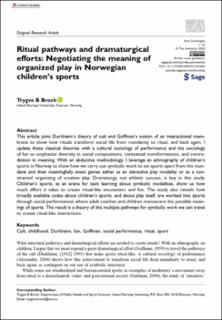Ritual pathways and dramaturgical efforts: Negotiating the meaning of organized play in Norwegian children's sports
Peer reviewed, Journal article
Published version
Permanent lenke
https://hdl.handle.net/11250/3119505Utgivelsesdato
2023Metadata
Vis full innførselSamlinger
Sammendrag
This article joins Durkheim's theory of cult and Goffman's notion of an interactional membrane to show how rituals transform social life from mundanity to ritual, and back again. I update these classical theories with a cultural sociology of performance and the sociology of fun to emphasize diversity in social compositions, contextual transformations, and contradiction in meaning. With an abductive methodology, I leverage an ethnography of children's sports in Norway to show how we carry out symbolic work to set sports apart from the mundane and then meaningfully enact games either as an attractive play modality or as a constrained organizing of creative play. Dramaturgy, not athletic success, is key in this study. Children's sports, as an arena for tacit learning about symbolic modalities, show us how much effort it takes to create ritual-like encounters and fun. The study also reveals how broadly available codes about children's sports, and about play itself, are worked into sports through social performances where adult coaches and children manoeuvre the possible meanings of sports. The result is a theory of the multiple pathways for symbolic work we can travel to create ritual-like interactions. Ritual pathways and dramaturgical efforts: Negotiating the meaning of organized play in Norwegian children's sports

